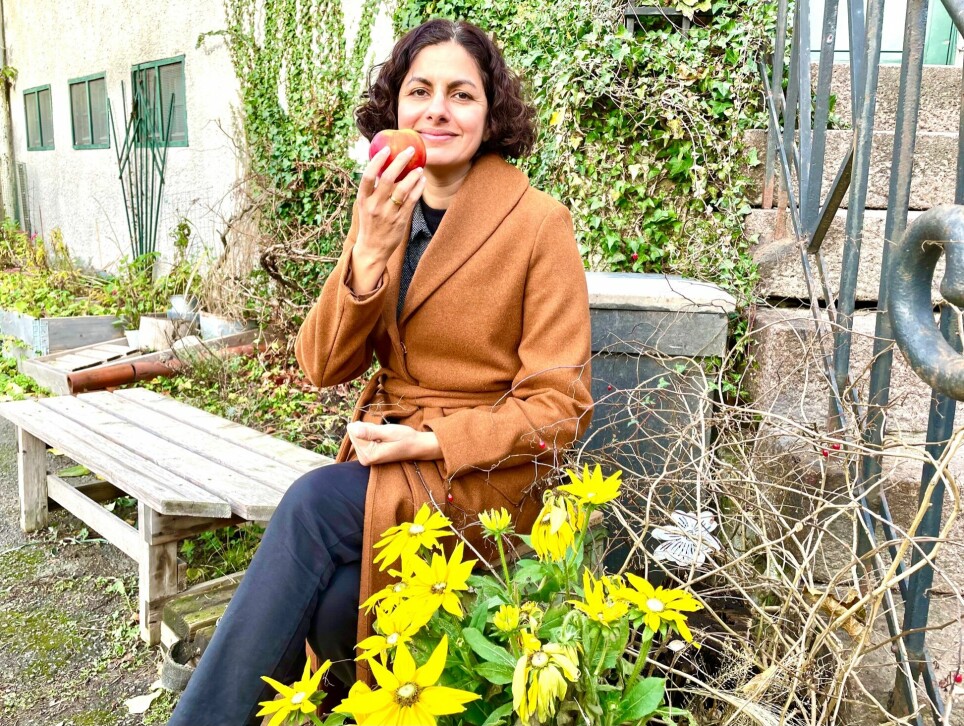
Patients who lost their sense of smell after Covid-19 are queuing up for help
Desperate patients who cannot smell their baby or think shampoo smells like sewage are queuing up for help from smell and taste specialist Preet Bano Singh at the University of Oslo. She is the only doctor in the country who offers qualified treatment.
Most of us take it for granted that we can smell the delicious scent of flowers and dinner dishes or the foul smell of milk that is out of date.
But at the clinic at the Faculty of Dentistry on Geitmyrsveien in Oslo, dentist Preet Bano Singh sees desperate patients who have lost their sense of smell and taste.
She’s had a lot more to do during the last year.
Singh has a doctorate in the sense of smell, and she is an associate professor and specialist in taste and smell at the University of Oslo.
She shows us a thick pile of data about patients who have been examined for a lost or distorted sense of smell or taste.
Many of them are now queuing up for treatment. Others are waiting in line to be examined.
Eight out of ten lose sense of smell
As many as 77 per cent of people who have had Covid-19 lose their sense of smell, according to international studies.
Half of them struggle with a lost or distorted sense of smell – some for as long as a year after they have otherwise recovered.
“The loss or distortion of smell affects the quality of life of these patients and weakens their mental health,” says Bano Singh.
She believes the problem is being downplayed by the health authorities.
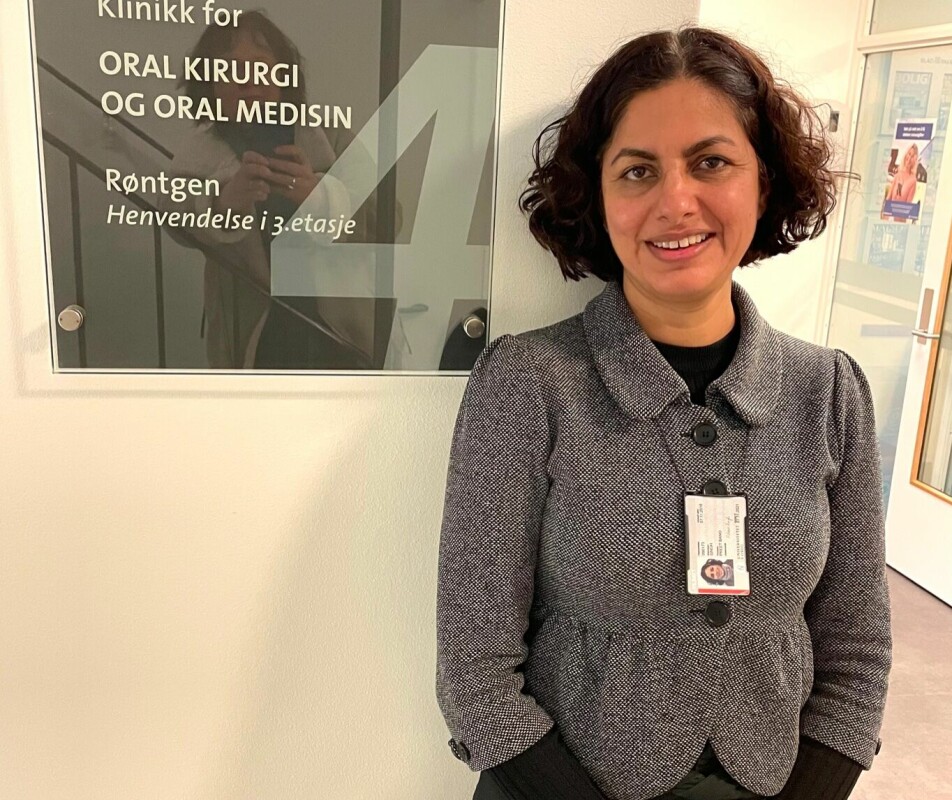
Mapping lost sense of smell and taste
Covid patients immediately notice when they lose their sense of smell and taste, according to Singh.
“A lot of people remember the exact date when they lost these senses,” she says.
Many of those affected had mild cases of the Covid-19 disease itself.
On average, the patients who come to her are 40 years old, non-smokers and had Covid eight months prior.
The first step when patients come to her is to determine how serious their smell or taste loss is.
- READ Norwegian study: More than half of young people with mild Covid-19 infections experienced Long Covid
Patients take odour tests
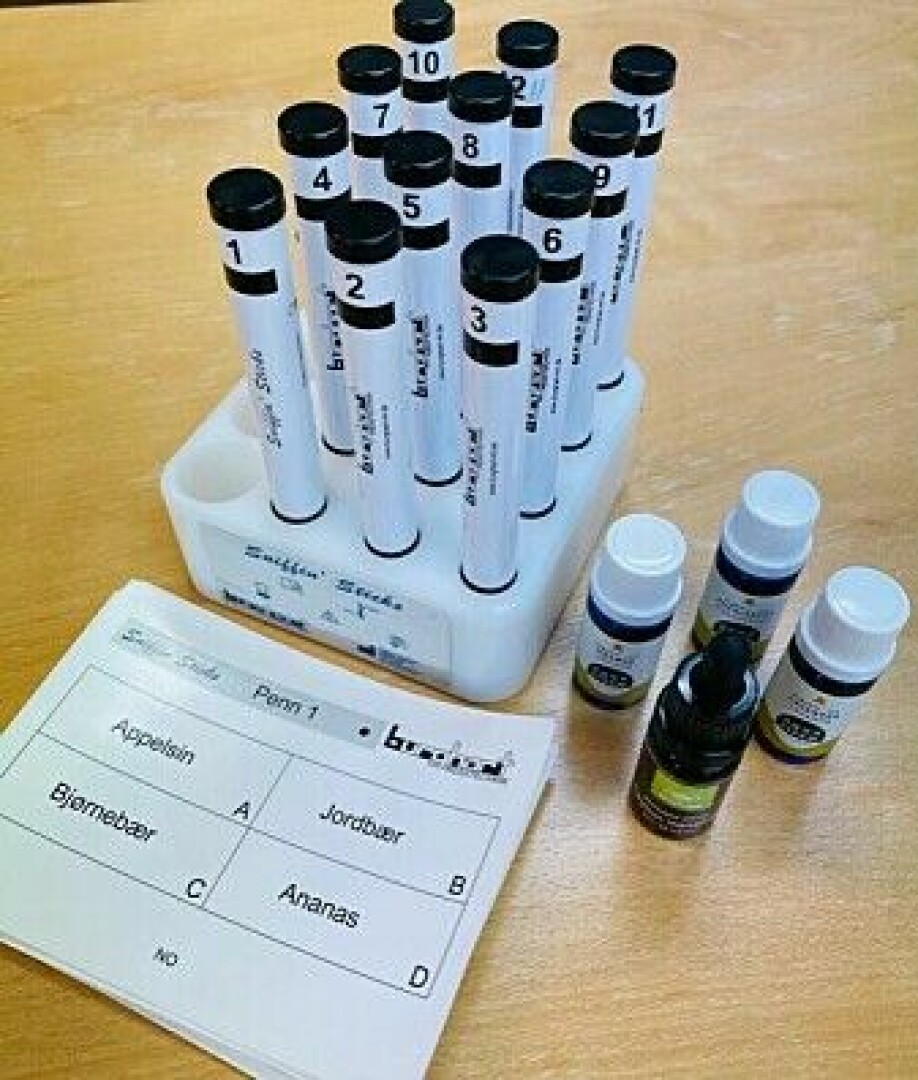
“Some people can smell a bit, others nothing. And an equally big problem is that many people have a distorted sense of smell and taste,” she says.
Patients first get checked for how much of their sense of smell or taste they have lost.
“The self-report should reveal which foods or other products they can no longer smell, and whether their sense of smell is gone all the time or only occasionally,” Singh says.
Eventually, the patient goes through a series of smell tests and taste tests to further map how extensive the sense loss is.
Distorted sense of smell and taste
But patients not only lose their sense of smell, many also experience distorted odours in their nose.
“Some people find that certain foods smell different than before. In particular, many people think that onions, garlic, coffee and fried foods smell bad,” says Singh.
Others respond that meats like chicken and bacon, cucumber, paprika, cola, beer and wine have a distorted odour. Some also think fish, pasta or potatoes smell bad.
Deodorant smells like vomit or sewage
Perhaps the worst thing for patients with a distorted sense of smell is that many hygiene products that actually smell fresh and clean, start to smell bad.
“They think toothpaste, deodorant, shampoo and cleaning products smell of vomit or sewage,” Singh says.
This can be a big problem when they have to brush their teeth or shower.
A lot of people can also no longer smell their own urine, sweat or faeces. Other people's body odours are distorted.
Affects social situations
“I’ve had patients who can no longer smell their own baby, or think that their boyfriend smells like onions or other offensive smells.
This condition affects the intimacy of relationships. Patients can no longer bear to hug and cuddle with their loved ones,” Singh says.
We know that smell is extremely important for establishing relationships, and it is also important among siblings and colleagues, she explains.
When we think others smell bad or are unsure of how we ourselves smell, we withdraw.
Several of the patients report that their smell problems have led to difficulties, and even break-ups, in their closest relationships.
Smell is directly linked to emotions
Singh is a graduate of the University Hospital Dresden in Germany. It was there that she took part of her doctorate in how smells are transmitted to the brain’s olfactory centre and are treated there.
“The sense of smell is the only sense that is connected to our limbic system. That is, smells hit the emotional area, where emotions, memories and associations are triggered,” Singh says.
“Good smells, like lilacs or a certain deodorant, can evoke childhood memories.”
Smell impressions cannot be overridden by reason, and so people are seriously affected when their sense of smell is disturbed – like when the usually good smell of our children is distorted into foul odours.
Depression and social isolation
Many affected people refuse to go to dinner parties with friends because they think certain foods smell or taste bad.
“They would rather say no than risk being served something that they can’t stand the smell of,” Singh says.
Others also refuse to go back to the office because they find that the coffee or their colleagues smell disgusting.
Some individuals become suicidal. These tend to be patients who have previously suffered mentally and socially, and who now find life has become extra difficult.
“Some people lose weight because they no longer think food tastes good. Others put on weight because they compensate for the lack of taste and smell by eating more,” Singh says.
Singh also maps what may be taste loss.
“Up to 80 per cent of our sense of taste is due to the sense of smell,” she says.
Distorted taste
Many patients are experiencing distorted taste. Some get a metallic taste in their mouth, others may have a salty or bitter – or even rotten – taste in their mouth,” says Singh.
In some people, the distorted taste is constant, so they have to take lozenges to offset the bad taste.
Others have distorted taste only occasionally or only when eating.
Singh then maps which foods taste different than they should.
“A lot of folks resolve the problem by steering away from certain foods in the worst phase.
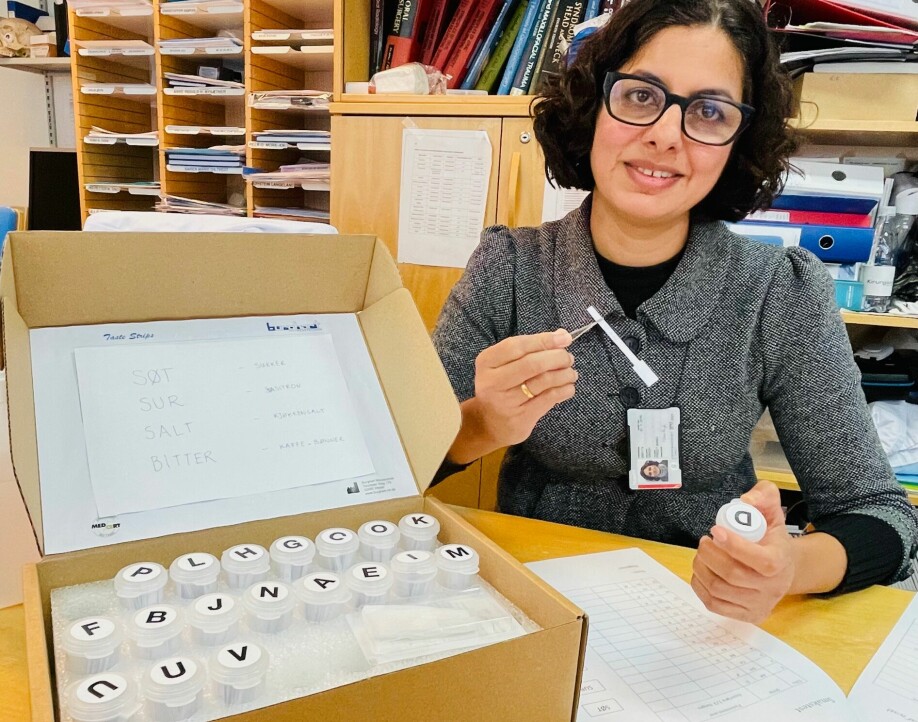
Burning in the mouth
Others have a constant burning sensation in their mouth. They report that it stings as if they were eating chili.
Singh then maps where in the mouth they have the feeling, whether on their tongue, lips or palate.
Dry mouth is the fourth problem that many people who have had Covid-19 experience.
“Some people wake up at night needing to drink something. Others need to have a water bottle available throughout the day.
Scent samples to identify
After the self-report, Singh goes through a whole series of smell tests with the patient. They are grouped by category, like floral fragrances, spices, fruits and scents like menthol and eucalyptus.
“Patients are given cards with the names of four varieties of fruit and then they have to say whether the test sample smells like orange, apple, banana or pineapple,” Singh says.
Some of the patients have agreed to participate in research on the topic.
She will use the information she has gathered about these patients in a study as soon as she has time to sort and analyse the numbers.
How to treat
Once a patient has been examined, Singh recommends appropriate treatment that involves retraining the sense of smell.
Patients are given the task of smelling various essential oils, which are categorized into four types of scent.
They smell one fragrance at a time as they think about everything that has to do with that particular aroma.
“If it's cinnamon, they could think of rice porridge, Christmas, the colour brown, for example,” says Singh.
When they smell lavender, they might think of the colour blue, lavender in a flowerpot or waving in the wind in a meadow, or lavender purchased in a cloth bag in Provence, things like that.
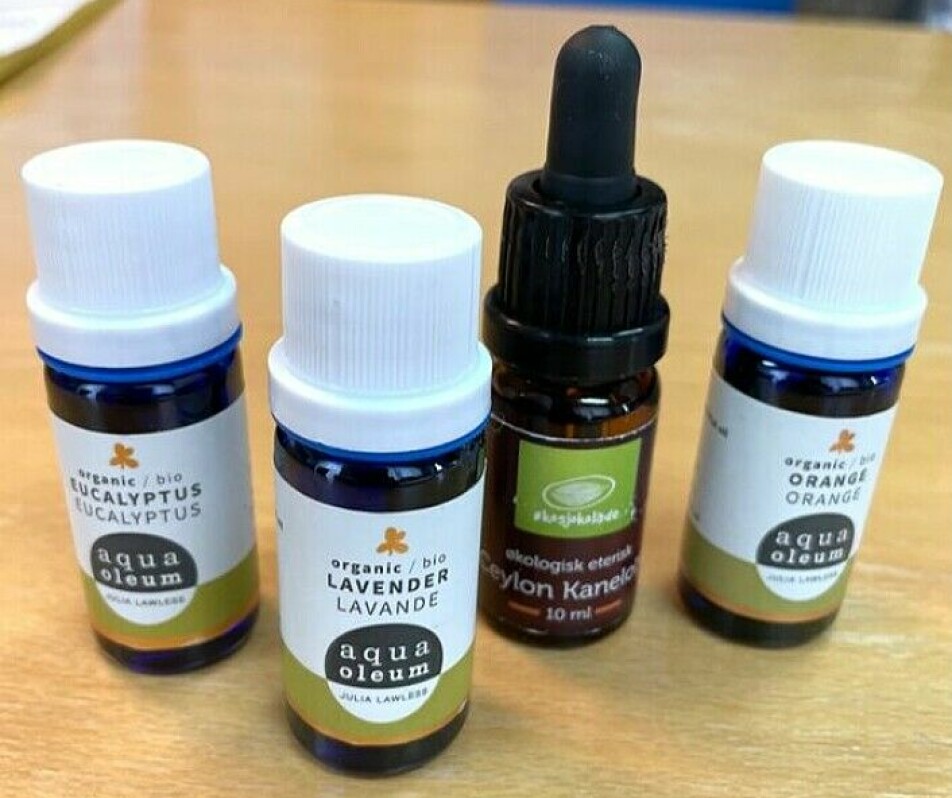
Retrieving memories is important
The patient goes home and buys four types of essential oils.
“They can choose whatever fruit or spice scents they want to train on, but they need to be in four different categories. And it’s important that the person practises with scents that are familiar to them from before,” says Singh.
They should practise smelling the oils for 20 seconds twice a day and put their soul into thinking about everything they associate with the scents.
If they smell orange, they should think about Christmas, Easter, all the memories they have of eating oranges.
She emphasizes that it is important to retrieve old memories associated with the oils they smell for the smell training to help.
New olfactory cells formed
The training works by using the brain's neuroplasticity. The olfactory cells are part of the nervous system and have a strong ability to regenerate.
According to Singh, most people regain their sense of smell.
“Of the 56 patients I’ve treated so far, only two still haven’t regained their sense of smell,” she says. This represents a success rate of 96 per cent.
“Only the sense of smell can be trained in this way,” says Singh.
The sense of taste cannot be retrained, but is instead treated with zinc tablets. Singh recommends taking antioxidants for burning in the mouth.
Wants to create a smell clinic
Singh’s colleagues in Sweden now have their own smell laboratory in Stockholm.
Singh believes Norway needs its own clinics for the rehabilitation of coronavirus sufferers as well. To date, she is the only smell specialist in Norway who can treat patients who have lost their sense of smell.
“To come here for treatment, the patient needs a referral from either a GP, a specialist or a dentist. People come from all over the country, and some pay for their own travel expenses if they’re not covered.”
But there is a limit to how many patients she can handle in a week, which leaves a lot of people waiting in line for a long time.
Smell and taste loss included in professional guidelines
Singh has asked the Norwegian Directorate of Health to include treatment for the loss of taste and smell in the professional plan for rehabilitation of long-term ailments following Covid-19.
In early December she was informed by the Norwegian Directorate of Health that the treatment has now been included in the newly revised version of the professional guidelines for rehabilitation after long-Covid.
“This was happy news. We hope patients will soon be able to visit a taste and smell clinic to receive treatment near where they live,” Singh says.
But getting clinics up and running could be a long row to hoe. Therapists need to be trained. And it is still unclear whether patients will be reimbursed for expenses.
Gave early heads up
“Patients with taste and smell problems need to be cared for, too. We could have treated far more people if we had received funding for more therapists,” says Singh.
The cost for the actual equipment for smell tests is minimal.
Singh gave an early heads up to the Norwegian Institute of Public Health (NIPH) that smell and taste loss was an early symptom of Covid-19. She believed the NIPH should encourage everyone who lost their sense of smell and taste to isolate themselves, to avoid infecting others.
Only well into the pandemic did the NIPH provide information that this was a typical symptom. In August 2021, a large study confirmed that smell loss and distortion was a widespread long-term symptom in people who had had Covid-19.
References:
K. Ohla et al.: Increasing incidence of parosmia and phantosmia in patients recovering from COVID-19 smell loss. August 2021. Preprint.
V. Parma et al.: More than smell—COVID-19 is associated with severe impairment of smell, taste, and chemesthesis. Chemical Senses, September 2020.
———
Translated by Ingrid Nuse
Read the Norwegian version of this article at forskning.no
































